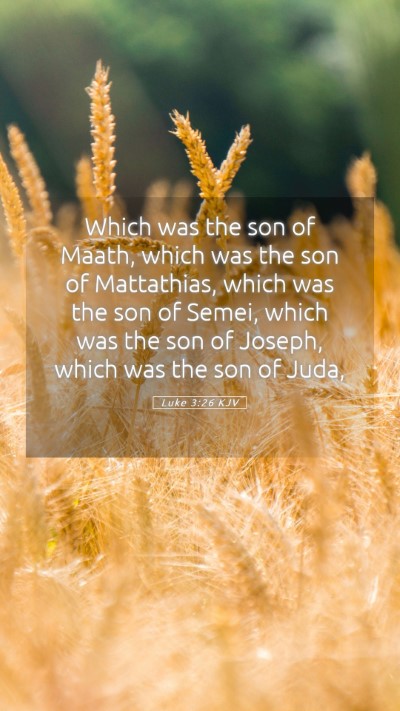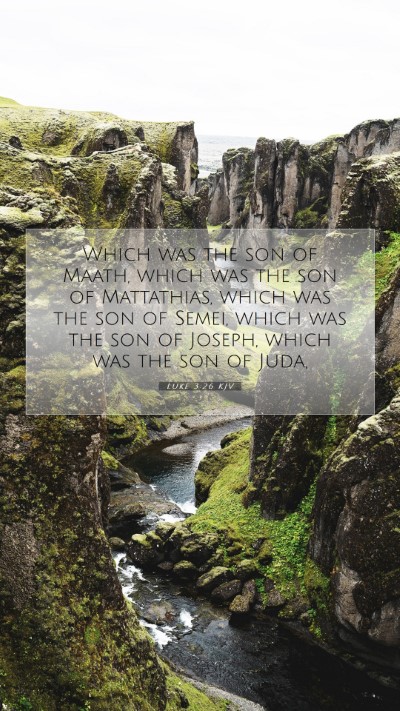Bible Verse Meaning: Luke 3:26
Luke 3:26: "The son of Maath, the son of Mattathias, the son of Mattathias, the son of Levi, the son of Simeon,"
Understanding the Context
This verse is part of a genealogy that establishes the lineage of Jesus Christ, which is crucial for validating His messianic claim. Matthew Henry notes the importance of genealogies in scriptural context, emphasizing that they authenticate Jesus' royal lineage, tracing back to David, highlighting His rightful claim as the Messiah. Albert Barnes also points out that the significance of genealogical records serves to demonstrate the fulfillment of Old Testament prophecies regarding the lineage of the Messiah.
Bible Verse Commentary
Adam Clarke highlights that the genealogy presented in Luke differs from that of Matthew in both sequence and names, reflecting different theological emphases and historical reasons. This indicates the diversity within the early Christian community's understanding of Jesus's heritage. This verse, while seemingly detailed and perhaps tedious to some, serves not only as a record but a testament to the authenticity and divinity of Christ. Such thoroughness in genealogies invites deeper reflection, necessary for understanding the significance of Jesus’ earthly ministry.
Significance of the Genealogy
- Historical Context: The genealogies provided in the Gospels connect Jesus with significant patriarchs and kings of Israel, reinforcing His identity as a central figure in Jewry and a fulfillment of the promise made to Abraham and David.
- Theological Implications: Each name listed in this verse carries weight; they represent not just a lineage but also the faithfulness of God throughout generations. The genealogy serves as a reminder of God's redemptive plan through history.
- Encouragement for Believers: This detailed account affirms the truth of Scripture, encouraging believers in their faith and bringing assurance that God's promises are fulfilled.
Application of Luke 3:26 to Daily Life
Understanding this verse leads us to appreciate God's meticulous plan for salvation, encouraging believers to reflect on their own lineage of faith. This verse can serve as a reminder that every life, no matter how seemingly obscure, contributes to God's overarching plan. It encourages individuals within Bible study groups to share their personal stories of faith and the importance of standing within a legacy of believers.
Additional Bible Cross References
- Matthew 1:2-16: Offers a contrasting genealogy focusing on Joseph's line, providing insight into Jesus’ legal claim to David's throne.
- Luke 1:32-33: This passage speaks of the promise that Jesus would reign on the throne of David, highlighting the importance of ancestry.
- John 7:42: A reminder that the expectation of the Messiah’s lineage was deeply rooted in Jewish understanding.
Conclusion
In summary, Luke 3:26 is much more than a list of names; it presents a rich tapestry of God’s faithfulness and the intricate plan of salvation through Jesus Christ. For those seeking Bible verse meanings, this verse exemplifies how even the most detailed genealogical accounts serve a purpose within the greater narrative of Scripture. Through historical context, theological insights, and personal applications in the life of believers, one can appreciate the profound meaning behind seemingly simple records.
Resources for Further Study
- Bible Study Guides: Explore genealogies and their significance in the Gospels.
- Online Bible Study: Participate in discussions that dive deeper into biblical genealogies.
- Bible Study Plans: Engage with scriptures that enhance understanding of Jesus' lineage and its implications.


